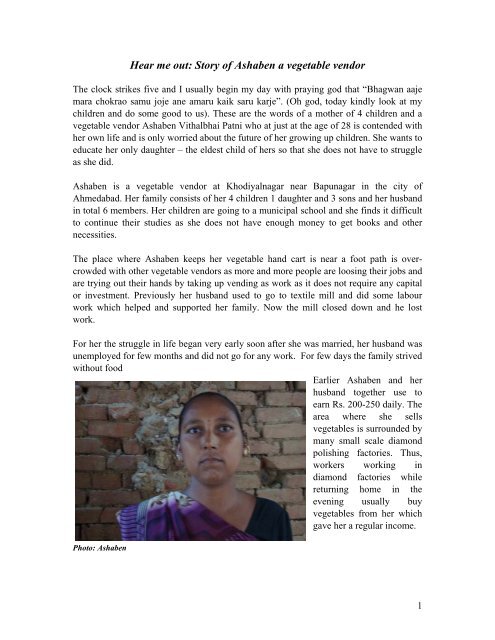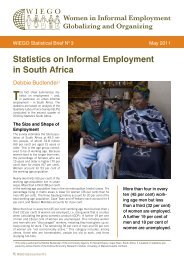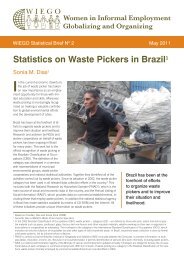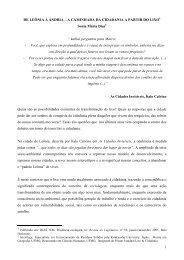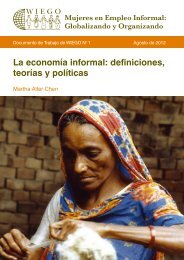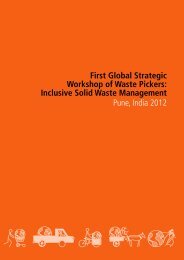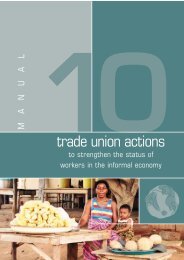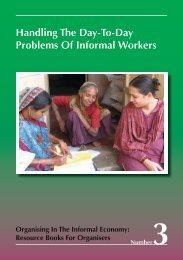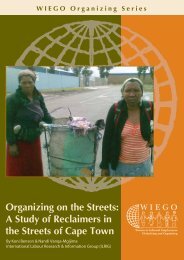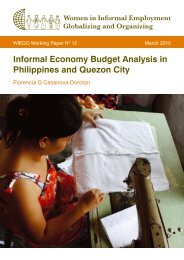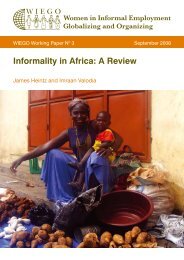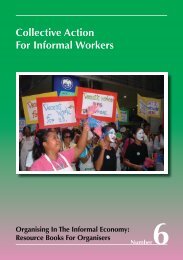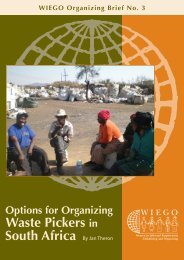Five Case Studies on the Financial Crisis ... - Inclusive Cities
Five Case Studies on the Financial Crisis ... - Inclusive Cities
Five Case Studies on the Financial Crisis ... - Inclusive Cities
You also want an ePaper? Increase the reach of your titles
YUMPU automatically turns print PDFs into web optimized ePapers that Google loves.
Hear me out: Story of Ashaben a vegetable vendorThe clock strikes five and I usually begin my day with praying god that “Bhagwan aajemara chokrao samu joje ane amaru kaik saru karje”. (Oh god, today kindly look at mychildren and do some good to us). These are <strong>the</strong> words of a mo<strong>the</strong>r of 4 children and avegetable vendor Ashaben Vithalbhai Patni who at just at <strong>the</strong> age of 28 is c<strong>on</strong>tended withher own life and is <strong>on</strong>ly worried about <strong>the</strong> future of her growing up children. She wants toeducate her <strong>on</strong>ly daughter – <strong>the</strong> eldest child of hers so that she does not have to struggleas she did.Ashaben is a vegetable vendor at Khodiyalnagar near Bapunagar in <strong>the</strong> city ofAhmedabad. Her family c<strong>on</strong>sists of her 4 children 1 daughter and 3 s<strong>on</strong>s and her husbandin total 6 members. Her children are going to a municipal school and she finds it difficultto c<strong>on</strong>tinue <strong>the</strong>ir studies as she does not have enough m<strong>on</strong>ey to get books and o<strong>the</strong>rnecessities.The place where Ashaben keeps her vegetable hand cart is near a foot path is overcrowdedwith o<strong>the</strong>r vegetable vendors as more and more people are loosing <strong>the</strong>ir jobs andare trying out <strong>the</strong>ir hands by taking up vending as work as it does not require any capitalor investment. Previously her husband used to go to textile mill and did some labourwork which helped and supported her family. Now <strong>the</strong> mill closed down and he lostwork.For her <strong>the</strong> struggle in life began very early so<strong>on</strong> after she was married, her husband wasunemployed for few m<strong>on</strong>ths and did not go for any work. For few days <strong>the</strong> family strivedwithout foodEarlier Ashaben and herhusband toge<strong>the</strong>r use toearn Rs. 200-250 daily. Thearea where she sellsvegetables is surrounded bymany small scale diam<strong>on</strong>dpolishing factories. Thus,workers working indiam<strong>on</strong>d factories whilereturning home in <strong>the</strong>evening usually buyvegetables from her whichgave her a regular income.Photo: Ashaben1
But now due to closing down of diam<strong>on</strong>d polishing factories many workers havemigrated to o<strong>the</strong>r places, many workers have started doing some o<strong>the</strong>r work, many havereturned to <strong>the</strong>ir native places and few of <strong>the</strong>m have entered into selling vegetables whichhas made <strong>the</strong>ir living very difficult and problematic.She is sitting at home without any work since 9 m<strong>on</strong>ths due to competiti<strong>on</strong> and crisis and<strong>the</strong>y have kept <strong>on</strong>ly 1 hand cart. Toge<strong>the</strong>r <strong>the</strong>y are now earning <strong>on</strong>ly Rs. 100-150 dailyout of which she spends Rs. 10/- against c<strong>on</strong>veyance, Rs. 20/- as tea and o<strong>the</strong>rexpenditure and Rs. 20/- to labourer. Thus, <strong>the</strong> total net profit which she gets into hand is<strong>on</strong>ly between Rs. 70 – 80.I cannot stop feeding to my family so I have taken loan of Rs.25000/- against security ofmy ornaments. I d<strong>on</strong>’t understand what I shall do to solve <strong>the</strong> problem. This made me<strong>on</strong>ce again go for taking a loan of Rs. 20000/- at 6% rate of interest.“Mandi ne karne amaro maal pan vahechato nathi” (Due to financial crisis we areunable to sell vegetables) states Ashaben with a grief and worry <strong>on</strong> her face. Ashabencomplains that she has not got any o<strong>the</strong>r additi<strong>on</strong>al skill and she is also illiterate whichhas cut off her hands and has restricted her from receiving any o<strong>the</strong>r work.Ashaben is currently undergoing a dual role and stress of a worried mo<strong>the</strong>r who wantsand dreams for bright future for her children and at <strong>the</strong> same time wishes a peaceful lifefor her husband.2
Cry from heart: Hansaben a waste picker“Aavi, Aavi, navi gadi aavi chalo chalo jaldi nahitar badhu vinai jase”. <strong>the</strong>se are <strong>the</strong>words loudly spoken by Hansaben a woman working as a waste picker at sewage farmdumping site in Ahmedabad informing all present at <strong>the</strong> sewage farm meaning “Comecome <strong>the</strong> new c<strong>on</strong>tainer has come be quick or everything will be collected”. This is <strong>the</strong>same general routine followed daily by nearly 200 waste pickers at <strong>the</strong> dumping site.Hansaben Keshubhai Solanki lives at Narol village, a remote area in <strong>the</strong> city ofAhmedaabd and is facing with a double edged sword both extreme poverty and doublediscriminati<strong>on</strong> - as a woman from a poor family.Hansaben’s day begins with waste and ends with thoughts and hope how can she collectmore waste tomorrow so that she can get more m<strong>on</strong>ey and feed her 2 small children withfull meal at least for some days. She has 2 daughters elder of 5 years and <strong>the</strong> younger <strong>on</strong>eis of 1.5 years.Hansaben is 25 years of age and is collecting wastesince she was 8 years of age. She accompanied hermo<strong>the</strong>r in collecting waste since childhood as <strong>the</strong>financial c<strong>on</strong>diti<strong>on</strong> of her parents was not good. Shecould not even go to school so does not know how toread and write but she can count <strong>the</strong> currency notesand understand <strong>the</strong> figures verbally.‘Aa kagaal che to ame loko jivvana nahitar kai nahikari sakie’ (because of this waste paper we are aliveor else it would be difficult to survive).‘Hu to bachpan thij kagal vache moti thai chu’ (I havegrown up between papers since my childhood). Still Iam with it; <strong>the</strong>re is a prevailing relati<strong>on</strong>ship observedbetween me and paper. I think I will end my life withpaper.Photo : HansabenWith tears in her eyes and trembling voice Hansaben narrated about a life changing andunforgettable incident in her life before 2 years. If this was not enough <strong>on</strong>e night myhusband got a severe attack of br<strong>on</strong>chial asthama and as I could not understand anythingwhat was happening to him I thought I have lost my husband. Instead of taking my3
husband to <strong>the</strong> hospital I started crying, shouting and beating myself which turned mymind blank.For taking my husband to hospital I have borrowed Rs. 25000/- at 3% rate of interest.Doctors have advised that my husband must take rest and must not involve in any hardwork so he is not doing any work.He was working as a salesman in a small garment shop and earning Rs. 2000/- per m<strong>on</strong>th.The income is totally stopped and now <strong>the</strong> family is solely dependent <strong>on</strong> my work. Inadditi<strong>on</strong> every m<strong>on</strong>th we have to spend Rs. 200 – 250 for medicines of my husband. I amnot able to make a balance between my basic needs and ends.‘Adhuru ma puri aa mandi aavi ne pitha par badha na bhav ghati gaya’ (in additi<strong>on</strong> dueto financial crises rates of waste at scarp shops has enormously reduced which worsenedmy problems). I start my work early in <strong>the</strong> morning at 6.30 am and return home by 5:00o’clock in <strong>the</strong> evening. I get tired and not able to take adequate care of my childrennei<strong>the</strong>r am I able to do any o<strong>the</strong>r work for increasing my earnings.4
Pretense of Silence: Shantaben a vegetable vendor“Mari to aakhi jindagi gai, have to ben kaik saru thai to saru, hu to bahuj thaki aneheran thai gai chu” (Many years of my life has passed hoping for some miracle to happenas I am very much tired and suffered a lot). Very nicely spoken by Shantaben a vegetablevendor at <strong>the</strong> Jamalpur natural market, <strong>on</strong>e of <strong>the</strong> main and largest market in <strong>the</strong> city ofAhmedabad. Lots of pain and tenderness seen in her eyes, her body proved about herunder nourishment and imbalanced diet, her pale face and dull voice were adding lots andlots about her situati<strong>on</strong> which she was unable to expressShantaben is a 55 year old woman with 4 children all living separately out of which 2daughters who are married and 1 s<strong>on</strong> also married with 3 children. The younger s<strong>on</strong> is <strong>the</strong><strong>on</strong>ly <strong>on</strong>e who helps her in vending vegetables with her and supports <strong>the</strong> family. Or elseno <strong>on</strong>e else is bo<strong>the</strong>red or serious about doing any work sincerely and earning someadditi<strong>on</strong>al m<strong>on</strong>ey which can support and improve <strong>the</strong> living of <strong>the</strong> family.Photo: Shantaben busy with her daily workShantaben is a native of Karnataka, after marriage nearly before 40 -45 years her husbandin search of work migrated to Gujarat and started going to textile mills as a labourer.Slowly <strong>the</strong> mills started getting closed and her husband started getting less work whichmade Shantaben also get involved in earning. “Nana nana balko ne sachavva mate kaikkaam to karvu pade ne etle hu ghanu badhu biju kaam karti hati” (To take care of mysmall kids I have to do some work so I did many small work) I used to go to grind spices,go as labourer for mas<strong>on</strong>ry work and do some o<strong>the</strong>r household work to feed my children.5
She regrets that she was not able to send her children to school and today she makesherself resp<strong>on</strong>sible for <strong>the</strong>ir down trodden and lives full of struggle. She forgets her painwhich she is undergoing since more than 35 years. Showing grey hair <strong>on</strong> her head shesays selling vegetables through out <strong>the</strong> day just by drinking 2-3 cups of tea and returningback home at 8.00 pm in <strong>the</strong> evening cooking an <strong>on</strong>ly meal of <strong>the</strong> day and feeding <strong>the</strong>family is a normal routine for Shantaben.Before November 2008, I use to earn Rs. 150 – 170 daily and now as <strong>the</strong> number ofvegetable vendors has increased which has created a great chaos in <strong>the</strong> existing marketand reducti<strong>on</strong> in my earnings.As <strong>the</strong> purchasing power of people is going down c<strong>on</strong>stantly, so people are buying lesserquantity of vegetables and 2 – 3 days <strong>the</strong>y do not at all purchase vegetables whichaffected my stomach and serving of food in <strong>the</strong> plates at home. My regular customershave also started buying less because of high prices of vegetables and which areunaffordable and even <strong>the</strong>y do not have m<strong>on</strong>ey. At present I am able to earn <strong>on</strong>ly Rs.100/- daily by great difficulty makes my family to eat at least <strong>on</strong>e meal a day.The sense of resp<strong>on</strong>sibility and faith in almighty God lead Shantaben to stand firm intimes of severest hardships. She is still waiting for <strong>the</strong> situati<strong>on</strong> to improve and <strong>the</strong> timewhen she can relax and feed her family enough food.6
Story of Struggles and Hope: Story of Tasleembanus a readymadegarment workerMarkets are flooded with colourful, different new patterns of ready made garments. Wedo not know <strong>the</strong> hands working behind it. The hands that work behind stitching of <strong>the</strong>sebeautiful garments have lots of pain in it. Yes, <strong>the</strong> story of Tasleem Saabir HussainNagori exactly describes <strong>the</strong> hard work, <strong>the</strong> silent cries and snobs of her children when<strong>the</strong>y are forced to sleep with less food in <strong>the</strong> stomach.Photo: Tasleembanu with her youngest s<strong>on</strong>Life has been a c<strong>on</strong>tinuous struggle for Tsleembanu living in poverty, not knowing whereher next meal would be coming from, Tasleem faced a bleak future. Tasleembanu lives inShahpur Nagoriwad in <strong>the</strong> city of Ahmedabad with her 3 children. Tasleembanu strugglesto meet her daily needs, educate children, and cook good food for her children and at <strong>the</strong>same time look after <strong>the</strong> health of <strong>the</strong> family. The drag<strong>on</strong> of financial crisis has affectedmany self employed people. No m<strong>on</strong>ey no food for any <strong>on</strong>eI was studying in 8 th standard and since <strong>the</strong>n I have started helping my mo<strong>the</strong>r in stitchingclo<strong>the</strong>s, me and my mo<strong>the</strong>r both stitched clo<strong>the</strong>s for neighborhood people up to mid night3 pm for sustaining <strong>the</strong> basic necessities of our family. The struggle for meeting <strong>the</strong> dailyneeds of <strong>the</strong> family made <strong>the</strong> b<strong>on</strong>d between us str<strong>on</strong>ger.Her husband drives an auto rickshaw which Tasleembanu has borrowed a loan <strong>on</strong> hername and she is paying interest <strong>on</strong> it. Her husband never hands over any earnings andgoes for work whenever he feels like and rarely gives m<strong>on</strong>ey to her for household7
expenditure. Tasleembanu is not allowed to move out of <strong>the</strong> house for any work whichmakes her tensed and more worried about future of her children.She has borrowed more than Rs. 50000/- at 10% rate of interest in last 3 m<strong>on</strong>ths and isunable to pay even <strong>the</strong> interest regularly resulting into <strong>the</strong> mounting up of interest. As shewas unable to pay school fees for her daughter she was not allowed to enter into <strong>the</strong>school. From borrowed m<strong>on</strong>ey she paid <strong>the</strong> fees and c<strong>on</strong>tinued her daughter’s educati<strong>on</strong>.Since November 2008, most horrible time is going <strong>on</strong> in Tasleembanu’s life as herhusband has g<strong>on</strong>e away and lives with his parents and is least bo<strong>the</strong>red about taking careof her or children. He has taken away all her ornaments and frequently comes to <strong>on</strong>lytake m<strong>on</strong>ey or for any need. The work available in <strong>the</strong> market is less and is able to getwork <strong>on</strong>ly for 2 days in a week thus she is left without work for more than 20 days in am<strong>on</strong>th. To feed her children Tasleembanu started working in nearby 2-3 houses washingclo<strong>the</strong>s and cleaning. But as usual her husband scolded her ordered her to stop going outand working and do <strong>the</strong> work which can be d<strong>on</strong>e by staying at home.Tasleembanu has to go and meet c<strong>on</strong>tractors and employers in different areas in getting<strong>the</strong> raw material for stitching. She works through out <strong>the</strong> day and she makes it possibleby any means to earn atleast Rs. 40 – 50 which can feed her family. But due to less workavailable she is able to earn <strong>on</strong>ly Rs. 40/- per day which is not sufficient for her family inthis time when <strong>the</strong> prices of all <strong>the</strong> necessities are shooting high.Even though I work up till late nights, I am unable to meet two ends. Day by day <strong>the</strong>situati<strong>on</strong> is turning worst and <strong>the</strong> income is also reducing as <strong>the</strong>re is no work availablewith <strong>the</strong> c<strong>on</strong>tractors in <strong>the</strong> market. Thank god I get help and support from my mo<strong>the</strong>r inall respects in terms of ec<strong>on</strong>omical, social and moral which gives me a ray of hope andstrength to live life or else I am al<strong>on</strong>e in this world.8
Cry from <strong>the</strong> heart: Sultanabanu acquiring livelihood through stitchingSultanabanu Iqbalbhai Sipai , a widow at <strong>the</strong> age of 37 and mo<strong>the</strong>r of 3 children – 1 s<strong>on</strong>and 2 daughters looks over matured to her age. Wants to rush back to work which canmake her earn some few more ruppes by which she can get some good food for herchildren. She lives at Sakra Gachi ni chali in gomtipur area in Ahmedabad. She livesback her past days and str<strong>on</strong>gly tells that she wants to educate her s<strong>on</strong> and make her asaheb (officer) and make her daughters life easy.‘Mere sauhar dedh saal pehle mar gaye’(I lost my husband before 1 1/2 years). His deathwas an unexpected and accidental death he fell down without any specific reas<strong>on</strong> and gotbrain hemorrhage and expired <strong>on</strong> <strong>the</strong> spot.As usual I was ill- treated by my inlaws and I was always passing my each day livingunder pressure and totally dependant up<strong>on</strong> ei<strong>the</strong>r my husband or my in-laws.After death of my husband I am not able to look after my children properly I do not haveany cash. I live in Ahmedabad in a house for which rent is Rs. 800/- per m<strong>on</strong>th and I amsuppose to spend Rs. 100-150 for electricity bill. Educati<strong>on</strong> of my children is alsoadversely affected and <strong>the</strong>y are transferred to a Municipal Corporati<strong>on</strong> School and I amunable to arrange for school uniform, books and o<strong>the</strong>r necessary requirements.And daily <strong>the</strong>re arises a list of items which are required by <strong>the</strong> children while going toattend school. I cannot spare m<strong>on</strong>ey to buy <strong>the</strong> things. Thus, I am upset and worriedabout how to make arrangement for all <strong>the</strong>se requirements.9
With a minor earning of <strong>on</strong>ly Rs. 50 – 60, and no <strong>on</strong>e to support I face lot of troublesarranging for food, clo<strong>the</strong>s and o<strong>the</strong>r requirements. Simply getting kerosene also isdifficult for which I pay high prices of Rs. 30 per liter. Many times I do not have enoughm<strong>on</strong>ey for buying kerosene so I have to ei<strong>the</strong>r borrow m<strong>on</strong>ey or else I request and get it<strong>on</strong> credit. But for how l<strong>on</strong>g people I will buy things <strong>on</strong> credit.‘Hu to allah ne dua karu chu ke jaldi mara chokra ne moto kari de ane kaame lagadi dejethi mane ane mari dikario ne sachve’ ( I pray to god to quickly make my s<strong>on</strong> matureand grow and make him work so he will start looking after me and my daughters).I can stitch simple clo<strong>the</strong>s like petticoats, frocks, covers so I am make sure and possiblydo what ever work I get.Due to financial crisis I am not getting enough work so I also do work of colouring kitestrings, made rakhees, etc. I am able to earn around Rs. 50-60 daily. But I think to meetwith <strong>the</strong> basic requirements at least Rs. 100 are required which I know for many days in<strong>the</strong> m<strong>on</strong>th I am not able to earn. I have borrowed Rs. 10000 at 5% interest rate from <strong>on</strong>eof my relatives which has sustained my family in <strong>the</strong>se crucial and difficult days.I feel very sorry and helpless as I am not able to serve 2 meals a day to my children andat that moment I miss my husband and think about many more single mo<strong>the</strong>rs like beraising children <strong>on</strong>e handedly without any<strong>on</strong>e’s support.10


